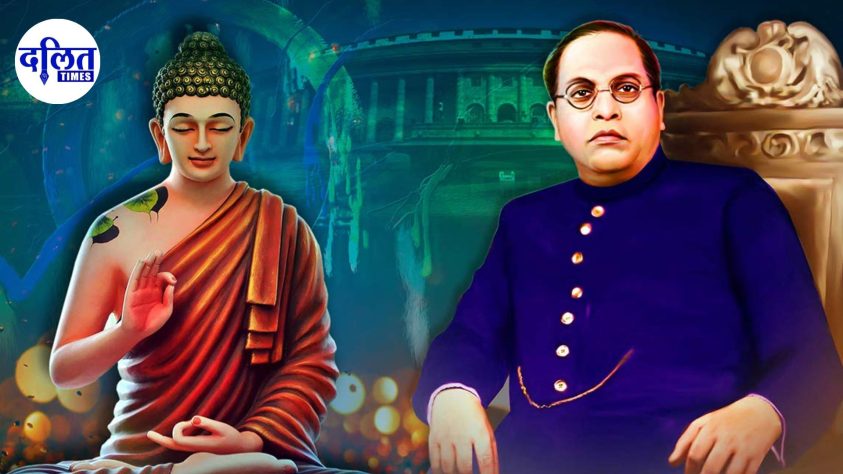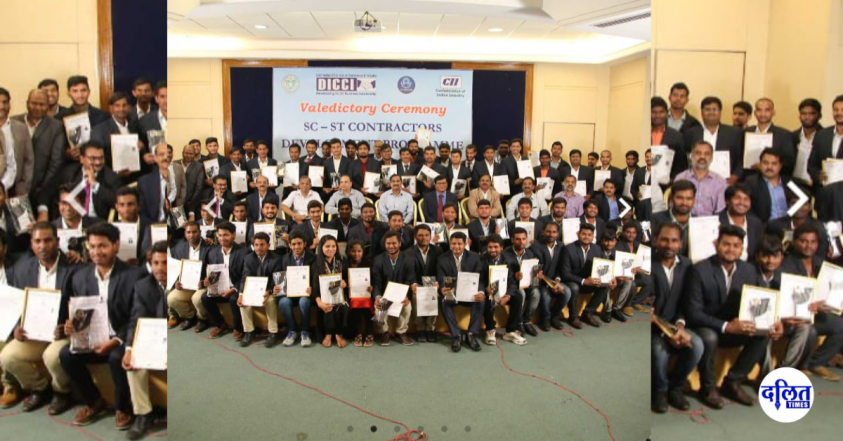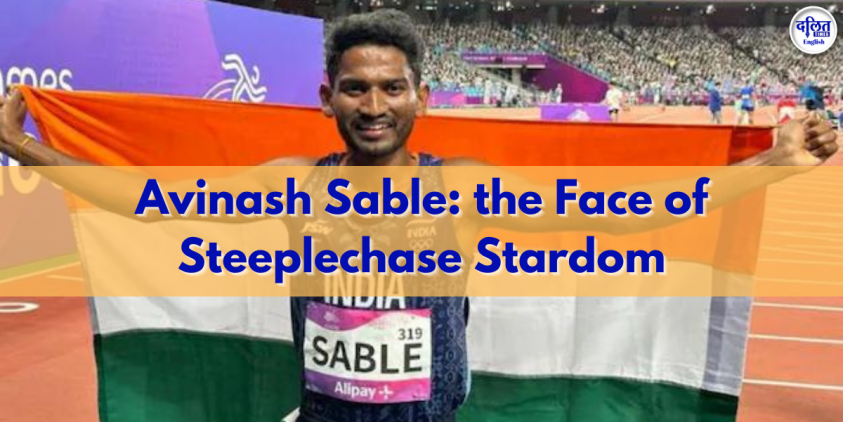I measure the progress of a community by the degree of progress women achieved. Dr.B. R. Ambedkar Women religious life is very difficult as any religion cannot give them the right to live freely. Religion confines women’s life through the traditions and cultural norms, which are mainly created by men and from the patriarchal perspective. Religious systems tend to foster and promote the power and voices of men at the expense of the women who make up the majority of adherents. When we talk about the Indian context, people of many religions live in India. Every religion has different aspects, ideology and different practices. A majority of Indian people have faith in one or the other religion, they live a religious life in private and public domain. For instance, in the Hindu practices, they wear religious thread on their wrist, they wear ashtgandh (saffron colour) on their forehead and they wear religious clothes also.
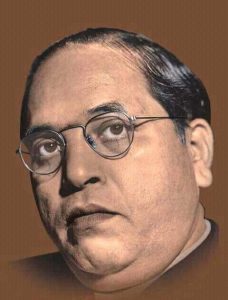
Through all this we recognize the religious people. It shows that they carry the religious identity every day. The question of women’s religious life remains controversial because women’s religious life has been controlled by men. In many religions men run the human culture, most aspects of human culture have been run by men, who have often used them to control women. The reason I am talking here about men and religion is that through this paper I am trying to understand the gendered aspect in the religious lives of Ambedkarite Buddhist women. In the contemporary period, women have gained awareness about their rights in every aspect, such as religious, political, social, educational and economical rights. Women have begun making choices about their life, and try to follow the path they have chosen. But many women still live their life under the control of men, because they are not financially independent.
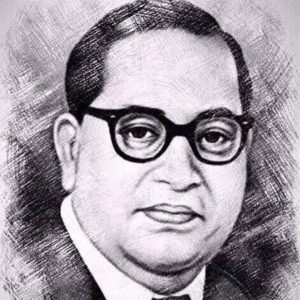
They have spent their all life in doing house chores and looking after their family. Therefore, they have not been to live freely. So they have had to be dependent on their husband’s earnings and have also been subjected to the family pressure that women should work in four walls and take care of their children, husband and in-laws. Within this larger context of women’s lived realities in the Indian context, I seek to explore why it is important to understand Ambedkarite Buddhist Women’s life. I argue that the majority of Ambedkarite Buddhist Women are very educated and have become financially independent as s direct consequence of following the Ambedkarite Buddhist ideology.
Their education and financial independence has thus ensured they are not bound by the social constraints that society has historically imposed on women and they are able to achieve a greater degree of freedom in their everyday lives than earlier. I argue that these achievements of the women in my sample are rooted in the fact that Buddhism teaches us to engage with life’s challenges rather than escaping them. Such teachings havem deeply inspired these women. They have therefore also found the path that gives them greater freedom in their everyday lives. As my respondent discussed, the Buddhist Path gives them freedom from all custom-based practices.
They have faith in the path that Dr. B. R Ambedkar showed them through Buddhism. His life inspired them and helping them to find a meaningful life. The Hindu caste system in India has created a system of unequal status by birth to human beings. Therefore, finding the ways to overcome and dismantle such a system became very important for these women to find the intellectual and meaningful life. Conversion of Dr. B. R Ambedkar in Buddhism Dr. Ambedkar was one of the most educated person in India. He acquired advanced degrees in social sciences. And the law from the best universities in the UK and the US. And through this he studied all social aspects in India and has written many books on the inequalities in Indian society and its religious problems.
In his exemplary and pioneering works, he has brought out how deeply Indian society is based on the caste and religion, where there is a high and low status assigned to people and people are discriminated against on the basis of their caste in the society. He himself experienced discrimination while getting education, because he belonged to a lower caste. Untouchability was practiced with certain castes and Ambedkar belonged to one of the caste among them. Therefore, he spent much time and energy to study the religions in India in great depth and finally decided to convert in to Buddhism. He finds that only the Buddhist path would lead better life, because in Buddhist religion all are equal, man is in centre of the Buddhist religions. Therefore, he embraced Buddhism along with half million people and showed the new path to live life.
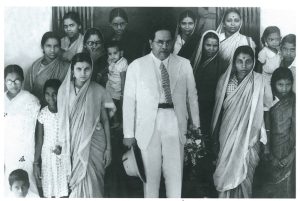
Dr. Ambedkar was also concerned about women’s lives in India because women could not move freely in the society, were prevented from getting an education, and they had a secondary position in society. Within the patriarchal structures of Indian society women were considered inferior and therefore confined to the domestic domain. Such discriminatory practices placed women’s lives entirely under the control of men. So in independent India Dr. Ambedkar wrote the Hindu Code Bill to legally codify women’s rights in various domain, but most of the educated people of the time, who belonged to the dominant castes, opposed the idea of Hindu Code bill and ultimately it was rejected in the parliament. Buddhism however does not restrict either educational opportunities of women or their religious freedom. Ambedkarite Buddhist Women and their life. For this research paper I have interviewed four Buddhist women.
Their names are as follows. Suvarna More, Sonali Mhaske and Deepali Chavan . Dr. Suvarna More has completed her PhD in Gender Studies from Pune University and now she is working as a research fellow at the same University. Dr. Sonali Maske, lives in Aurangabad. She has completed her PhD in History dept from Dr. Babasaheb Ambedkar Marathwada University and now she is working as a guest faculty in the same university. Deepali Chavhan has done her Master’s in Social work, and a one- year Diploma in gender studies. She is now working on women farmers issues with a well known organization. While interviewing Ambedkarite Buddhist women, I could understand that all of them are well educated.
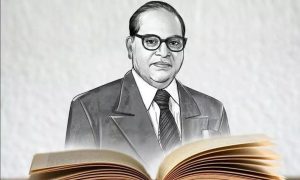
Three of them have completed their PhD. Now they are employed in reputed Indian educational institutions. One has done her masters and doing job in well recognized NGO. All four women whom I interviewed are aware about the gender / human rights. Apart from their jobs, all four of them are associated with social movements and socially engaged with Buddhism. They are recognized within social, academic and political circles as activists who fight for the equality.
When I asked them about which of Buddha’s teachings they follow the most in their daily life, they all answered that they like the Buddha’s teachings like “Att Deep Bhav”, Maitri, Karuna, Anitya (impermanence) the most and they practice these teachings in their daily life.
They also believe in the path that Ambedkar has shown them of liberty, fraternity and equality. All of them have mentioned about this principle in their interviews. None of them believe in the religious ritual, they all reject it. They believe in being rational and carry the identity of being Buddhist. For them, to live as a Buddhist is not to live religiously, but to live in a rational way. Like many Buddhist people do meditation, All are inspired from the Dr. B. R Ambedkar’s life and his work for the society. He encouraged people to be graduates and work in the academic spaces. He also helped lower caste people in getting jobs in the government sectors. He made us aware about the varna system and taught us to fight against such discriminatory practices towards some communities.
Dr. B. R Ambedkar’s philosophy stands for equality, liberty, fraternity and justice which lead to the path of enlightenment. Therefore, many people call themselves as Ambedkarite Buddhist and these four women are among them. Buddha’s teaching and the path shown by him is a framework for the transformation of society. Since people in India have historically been divided into castes, and people look down upon them on the base of caste, caste-based practices are
discriminatory. For instance, people from upper caste people practise untouchability towards lower caste people and we have been fighting against this for long time. Untouchability is still practiced in the society by particular castes. Therefore, Dr. Ambedkar not only fought for the equality but he also changed his religious identity and became a Buddhist because he considered Buddhism an egalitarian religious system.
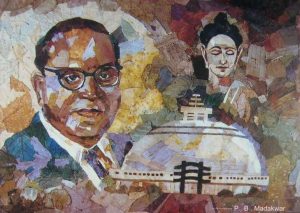
The women I interviewed are associated with Buddhist Sangh’s. Two of them are associated with Bauddh Sangharsh Samiti. Sonali is associated with university level Phule-Ambedkar study group that studies Buddhism through the lens of Dr. Ambedkar. Through their association with such groups (named above) they all work to spread the Buddhist teachings among people. They lead the people who wants to become Buddhist towards conversion and living a Buddhist life. They organise retreats on the weekends in different areas where they teach the path of
Ambedkar and Buddhism. In this way they meet number of people across the regions and bring them into the group where they can read and understand Buddha’s teachings and can gradually become Buddhist. Such groups mostly have been formed by the educated Buddhist people.
On account of the education they have acquired and the prestigious jobs they hold in the line with their Ambedkarite Buddhist identity, thier personalities appear strong and inspiring and there fore positively influence people who want to adopt Buddhism. Many educated young people have adopted the Buddhism, they converted to Buddhism and have officially become Buddhist. They are officially recognised as Buddhist, because they took part in the conversion ceremony which is mainly organised in public domain and entails adopting Buddhism through some rituals.
Those who became Buddhist earlier were Hindu i.e they earlier belonged to a religion entrenched in the caste system. So this is the kind of significant and transformative work that these Ambedkarite Buddhist Women are doing. They provide the material to newcomers for reading and studying Buddhism. Through the reading and observing how the Buddhist people are living their lives, the newcomers are initiated into and become Buddhist.However, it is important to note that often people called themselves as Buddhist, but actually
they continued to practice the Hindu religion and believed in God. Ambedkarite Buddhist Women on the other hand have denied the existence of God. Once they become a Ambedkarite Buddhist, they don’t believe in God. They become rational and develop reflective thinking.
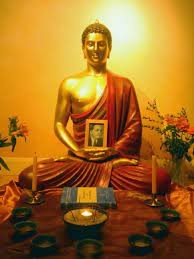
.
They give importance to becoming more Ambedkarite and Buddhist.
These four women belong to the lower social strata as per the traditionally imposed norms of Hindu society in India. Lower social strata means that in Hindu religion there is a Chaturvarna system, which has four varna’s, Brahmin, Kshatriy, Vaishya and Shudra which the hindu scriptures defines as follows. Brahmins means priests, Kshatriy means solders, Vaishya means traders, and Shudra means menials. Dr. Ambedkar states that these four varna’s made principle
of graded inequality the basis for determining the terms that associated life between classes. Under this four varna system, Shudra is not only placed on the bottom of the gradation, but they are subjected to innumerable ignominies and disabilities so as to prevent them from rising above the condition fixed for them by varna system.
So Dr. Ambedkar studied many religion and their respective philosophies and he found that it was the Buddhist path that met his complex requirements of reason, morality and justice. Buddha’s dharma for Dr. Ambedkar was its emphasis on rational choice. So, he decided to embrace Buddhism which would give him a
dignity in the society and the ability to lead a meaningful life outside the varna system. The women I interviewed for this paper also place a high value on being rational. But in India being Buddhist is not valuable for varna system, because for the varna system, caste matters the most. As the caste system is followed in every religion except Buddhism. people in the mainstream still view these women as coming from lower castes and discriminate against them on that basis.
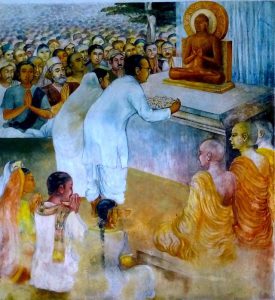
A large number of Hindus live in India and they caste inequality in in graded in their mindset, they continue to see people from the graded caste perspective. In such a society, women were given a secondary position, so we see that women were deprived of their basic rights. Therefore, such women give more importance to becoming an Ambedkarite Buddhist in search of their way of liberation, because becoming a Ambedkarite Buddhist means on the one hand to fight against such caste system and on the other hand to live a conscious and
rational life by imbibing the Buddha’s teachings. Being women, we all know how we live our life. These women are happy and feel proud of being Ambedkarite and Buddhist.
All the women I interviewed are the first-generation learners in their families. They said that because of the education they acquired, they were able to study the social issues in the practises of religion. They also said that they could learn to see differences on the basis of class and caste. They said that women who don’t get education are not able to fight against the customs of the society, when you get education you become a competent person, and can fight for your rights. Through it, women find their ways where they find the way to liberation and a
meaningful life.
Therefore, Buddhist women in India give more importance to become Ambedkarite Buddhist because Ambedkar embraced Buddhism and showed a new and liberating path in India. They said that being a Buddhist in India is a distinction. As Buddhists we learn two things. One is that being an Ambedkarite Buddhist means we move forward in response to the discrimination that exists under the caste system, and the other is that we as Buddhists follow the Buddha’s
path shown by the Dr. Ambedkar, whereby we look at our lives as they are and find a way that empowers us to live. Also, while living a religious life as a Buddhist, they say that many times negativity arises in life, but we make a way out of negativity, the negative feeling in us never ends.
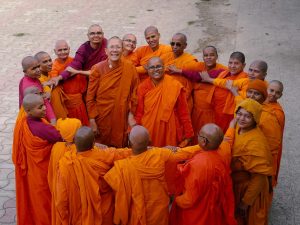
Conclusions – Ambedkarite Buddhist women look to Buddhism as a hopeful way of living in such aprecarious world. They look upon Buddhist path as meaningful and peaceful way. Their identity stands out from other Buddhist women as a strong identity. They live a revolutionary life, trying to make others adopt the same path that they have got through becoming a Buddhist. The change in the lives of these women can be seen due to education. Through education they could understand Buddhism better. They all find the Buddhist teachings very effective which lead their life toward emancipations. Babasaheb Ambedkar’s influence can be seen in their life today, and being an Ambedkarite Buddhist means living a self-respecting life for them.
Author : Shubhangi Satkar
